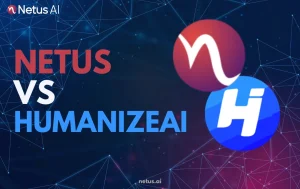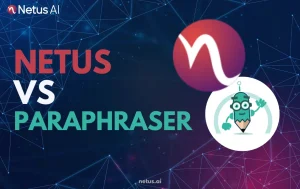
Netus vs. HumanizeAI | Netus.ai
Netus.ai vs. HumanizeAI: Which tool excels in AI bypassing, human-like rewriting or academic reliability? Dive into this detailed breakdown comparing features, accuracy or use cases.
Will AI Detection Hinder My Ability to Publish Research
Papers?

Content writer and editor for Netus.AI
Will AI Detection Hinder My Ability to Publish Research Papers? Artificial Intelligence (AI) has become increasingly prevalent in many industries, including academia. While AI has the potential to revolutionize the way research is conducted, there are concerns that it may also impede academic freedom. Specifically, some researchers worry that AI detection technology may prevent them from publishing their research papers.
The use of AI detection technology in academic publishing has become more widespread in recent years. This technology is designed to identify plagiarism, duplicate publication, and other forms of academic misconduct. While the intention behind this technology is to maintain the integrity of academic research, some researchers worry that it may also lead to false accusations and prevent legitimate research from being published.
Despite these concerns, many academic publishers are implementing AI detection technology as a standard part of their submission process. As a result, researchers must be aware of the potential implications of this technology and take steps to ensure that their research is not wrongly flagged as misconduct. In this article, we will explore the use of AI detection technology in academic publishing and its potential impact on researchers.
Artificial Intelligence (AI) has become an integral part of modern research paper creation. Researchers and academics use AI to help them analyze data, identify patterns, and draw conclusions. AI has made the research process more efficient, accurate, and reliable. However, the use of AI in research paper creation has also raised concerns about the potential for AI detection to prevent researchers from publishing their work.
AI detection algorithms are used by academic publishers to identify potential plagiarism, duplicate content, and other forms of misconduct. These algorithms use machine learning techniques to identify patterns in text and compare them to a database of previously published work. If the algorithm detects a potential issue, it will flag the paper for further review by human editors.
The use of AI detection algorithms has had a significant impact on academic publishing. It has made the process of identifying potential misconduct more efficient and reliable. However, it has also raised concerns about false positives and the potential for legitimate research to be flagged as misconduct.
In conclusion, AI detection is an important tool in academic publishing. It helps to ensure the integrity of the research process and prevent misconduct. However, it is important to be aware of the potential limitations and challenges of AI detection, and to use it in conjunction with human editors and reviewers.
Authors face the challenge of ensuring that their research papers are original and free from plagiarism. With the increasing use of AI detection software by publishers, authors need to be diligent in avoiding any form of plagiarism. This means that authors must be careful when using other people’s work, and they should always give proper credit to the original authors.
To avoid plagiarism, authors can use plagiarism detection software to check their work before submitting it. They can also use proper citation methods, such as APA, MLA, or Chicago, to give credit to the original authors. Additionally, authors can paraphrase the work of others and use quotation marks when necessary.
Publishing policies and procedures are constantly evolving, and authors need to adapt to these changes to ensure that their research papers are accepted for publication. Authors must be aware of the policies and procedures of the journals they are submitting to and ensure that their papers comply with these policies.
Some of the policies and procedures that authors need to be aware of include ethical considerations, such as the use of human and animal subjects in research, data sharing, and conflicts of interest. Authors must also follow the guidelines for formatting and submitting their papers, including the use of specific fonts, margins, and spacing.
In conclusion, authors need to be aware of the challenges and considerations they face when publishing research papers. By being diligent in avoiding plagiarism and adapting to evolving publishing policies, authors can increase their chances of having their papers accepted for publication.
The publishing process involves several steps, including editorial and peer review procedures. Editors are responsible for ensuring that the content is of high quality and meets the standards of the journal. They also check for plagiarism and other ethical issues. Peer review is a process in which experts in the field evaluate the content for scientific integrity, accuracy, and relevance.
The use of AI in editorial and peer review procedures is becoming increasingly common. AI tools can help editors and reviewers identify potential issues such as plagiarism, data fabrication, and other ethical concerns. However, AI tools are not a substitute for human judgment and expertise.
AI-generated content is also subject to scrutiny in the publishing process. AI tools can be used to generate content, such as abstracts, summaries, and even entire articles. However, the quality and accuracy of AI-generated content must be evaluated carefully.
Criteria for assessing AI-generated content include the following:
Overall, the use of AI in the publishing process can help improve the quality and accuracy of research papers. However, it is important to remember that AI tools are not a substitute for human expertise and judgment.
The emergence of AI detection tools has raised concerns among the academic community about the potential impact on scientific writing standards. While these tools can help detect plagiarism and improve the quality of research papers, they may also lead to over-reliance on technology and a decline in critical thinking skills.
To maintain scientific writing standards, it is important for researchers to use AI detection tools as a supplement to their own critical thinking and writing skills. Researchers should also ensure that they understand the limitations and potential biases of these tools, and use them in conjunction with other methods of research and analysis.
The use of AI detection tools in academia is likely to become more widespread in the future. As AI technology continues to advance, it is possible that these tools will become even more sophisticated and accurate at detecting plagiarism and other forms of academic misconduct.
However, the academic community must also be aware of the potential ethical implications of using AI detection tools. For example, there may be concerns about privacy and data security, as well as the potential for bias or discrimination in the algorithms used by these tools.
Overall, the use of AI detection tools in academia has the potential to improve the quality of research and maintain scientific writing standards. However, it is important for researchers and institutions to use these tools responsibly and in conjunction with other methods of research and analysis.
Researchers often require access to a wide range of knowledge and publication support to ensure that their research is of the highest quality. Institutions can provide researchers with access to various resources, such as online journals, databases, and libraries, to facilitate their research.
In addition, some institutions offer publication support services, such as proofreading, editing, and formatting, to help researchers prepare their manuscripts for submission. These services can be particularly useful for researchers who are not native English speakers or who are unfamiliar with the publication process.
Ethical considerations are an essential aspect of research, and institutions can provide researchers with the necessary support to ensure that their research adheres to ethical guidelines. This support can include training on ethical conduct, access to institutional review boards, and guidance on data management and sharing.
Institutions can also provide researchers with institutional support, such as funding opportunities, mentorship programs, and access to scientific literature. These resources can be critical for researchers, particularly those who are early in their careers or working in under-resourced areas.
Overall, institutions play a vital role in supporting researchers and ensuring that their research is of the highest quality. By providing access to knowledge and publication support and offering ethical considerations and institutional support, institutions can help researchers navigate the complex landscape of research and publishing.

Netus.ai vs. HumanizeAI: Which tool excels in AI bypassing, human-like rewriting or academic reliability? Dive into this detailed breakdown comparing features, accuracy or use cases.

Netus.ai vs. BypassAI: Which tool excels in AI bypassing, human-like rewriting or academic reliability? Dive into this detailed breakdown comparing features, accuracy or use cases.

Netus.ai vs. AIUndetect: Which tool excels in AI bypassing, human-like rewriting or academic reliability? Dive into this detailed breakdown comparing features, accuracy or use cases.

Netus.ai vs. AIUndetect: Which tool excels in AI bypassing, human-like rewriting or academic reliability? Dive into this detailed breakdown comparing features, accuracy or use cases.

Netus.ai vs. Paraphraser: Which tool excels in AI bypassing, human-like rewriting or academic reliability? Dive into this detailed breakdown comparing features, accuracy or use cases.

Netus.ai vs. Smodin: Which tool excels in AI bypassing, human-like rewriting or academic reliability? Dive into this detailed breakdown comparing features, accuracy or use cases.
@ 2024 Netus AI.